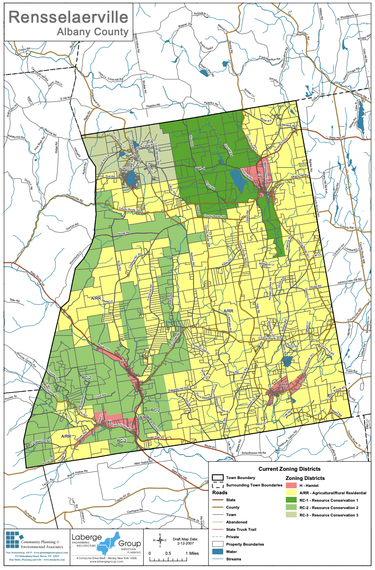Rensselaerville tentative budget: Some special districts see tax jump
RENSSELAERVILLE — Spending and taxes are overall steady in Rensselaerville’s $3 million tentative 2023 budget, but residents in certain special districts may see tax jumps if the current figures hold.
The town’s two lighting districts and the Rensselaerville Fire District all feature double-digit percentage increases and bring the total tax rate to its state-set limit of 2 percent. However, since the total amount of money being dealt with is relatively small, the absolute impact of the increases may be similarly small.
The tax levy for the Preston Hollow lighting district has gone up from $4,500 to $8,556 — an increase of $4,056, or 47.4 percent. The levy for the Rennselaerville lighting district has gone up from $4,900 to $8,124 — an increase of $3,224, or 39.7 percent. The levy for the fire district has gone up from $56,957 to $74,937 — an increase of $17,980, or 24 percent.
Townwide taxes, which go toward the budget’s general and highway accounts, will remain virtually unchanged. Together, the two accounts will draw an additional $2,797 from taxpayers compared to last year, which had a total tax levy of just under $1.2 million.
The majority of the additional tax money in the two lighting districts is being devoted to light-emitting diodes; LEDs have a higher energy efficiency than other forms of lighting. Supervisor John Dolce could not be reached to discuss the long-term tax impact.
The LED lines in the two lighting districts total $5,180, over a full appropriations value of $16,680. That would leave $2,100 in additional tax money, which may be required to offset rising electricity costs nationwide.
For the Rensselaerville Fire District, the higher tax rate is here to stay — or so Fire Chief Robert Tanner hopes.
He told The Enterprise this week that the additional funds are needed to cover expenses associated with state-mandated training and equipment and other operational costs.
“We just couldn’t afford it on what we’re doing,” he said. “The fundraisers weren’t making it … We finally just had to say, ‘Look, this is what we need to keep functioning.’”
For the past three years, the department was budgeted $52,020 — the least among the Medusa and Tri-village fire companies.
“We haven’t asked for a tax increase in as long as I’ve been with the fire department, and that’s been over 40 years,” Tanner said.
He explained that residents get a lot of bang for their buck compared to a professional fire service, and that “if we had to go to a paid company, [the increase] would be astronomical. There’s just no way you could afford it.”
Tanner also noted that, when the numbers are broken down, the household change won’t be significant, though he acknowledged he didn’t have exact figures readily available.
“It’s not going to hurt,” he said. “I’m a homeowner and I have to pay it too.”
Of course, nothing is set in stone yet, as the preliminary budget mostly features department requests and projections, with residents and the board yet to weigh in and temper the numbers.
“If the town and the people go with it, that’s great,” Tanner said. “But if they say, ‘We can’t quite do that, but we’re going to give you something,’ something is better than nothing … Hopefully, this is going to be the new norm.”
Other changes
As already noted, the headline figures for this year’s budget — townwide appropriations, revenue, and taxes — are more or less the same, save for the select districts, but some notable changes are present within the different sections of the tentative budget.
For instance, a significant chunk of tax revenue is diverted from the general account, which receives $74,442 less than it did in the adopted 2022 budget, to the highway account, which receives $77,239 more than it did in the 2022 budget. (The difference between them represents the infinitesimal townwide tax increase, which is less than a hundredth of a percent).
The highway department expects to spend more next year on machinery and snow materials, with machinery eating up an additional $82,000 and snow materials an additional $12,367.
In the general account, a notable decrease is from last year’s one-time expenses for a $180,000 recycling truck, as well as $12,000 for a grant writer, which make up for the difference in the highway account’s increases and other increases in the general account.
For instance, several town employees are receiving raises. The part-time supervisor, who last year was budgeted $18,000, is allowed $19,500 in the tentative budget — an 8-percent increase.
The four part-time town council members together receive $18,000 in the tentative budget, compared to $16,800 last year — a roughly 7-percent increase, with the money split among four people.
The town clerk — a full-time post — receives $41,000 in the tentative budget, compared to $39,000 last year — a 5-percent increase.
Similarly, the town’s attorney receives an extra $1,000 compared to last year’s $38,000 for an increase of roughly 3 percent, and several of the departments’ ancillary workers (for example, supervisor’s clerk, clerk deputy,and justice clerk) receive raises as well.
Often, these salaries are conditional on hours worked or meetings attended, and do not always reflect the actual expenses at the end of a year. Nevertheless, salary increases are naturally a common source of controversy given the inherent conflict of interest that exists within a government that determines its own compensations (regardless of whether said government actually acts selfishly).
Rensselaerville seems to get more flak than other Hilltowns for its raises, though it’s not clear why, as the salaries within the town tend to be in range of those elsewhere.
In 2018, salaries were a sticking point for the Rensselaerville budget, with former Councilman Jason Rauf, who is now the highway superintendent, arguing that critics were overly fixated on percentage figures, which can be inordinately striking compared to the increases themselves.
The same point was brought up again the next year by Supervisor Dolce amid similar criticisms. He added that the salaries — particularly for the part-time positions, which all the town council positions are — appear especially measly when considered in terms of money earned per hour of work.
Councilman Brian Wood told The Enterprise at the time, “I’m on my way to vacation and have spent more than a quarter of my drive on the phone or email. I can’t eat breakfast at the diner without having to talk about the town.”
Wood also posited that low salaries might contribute to the lack of interest in the positions, which has been a chronic problem in the town, with the past two elections being non-competitive.


